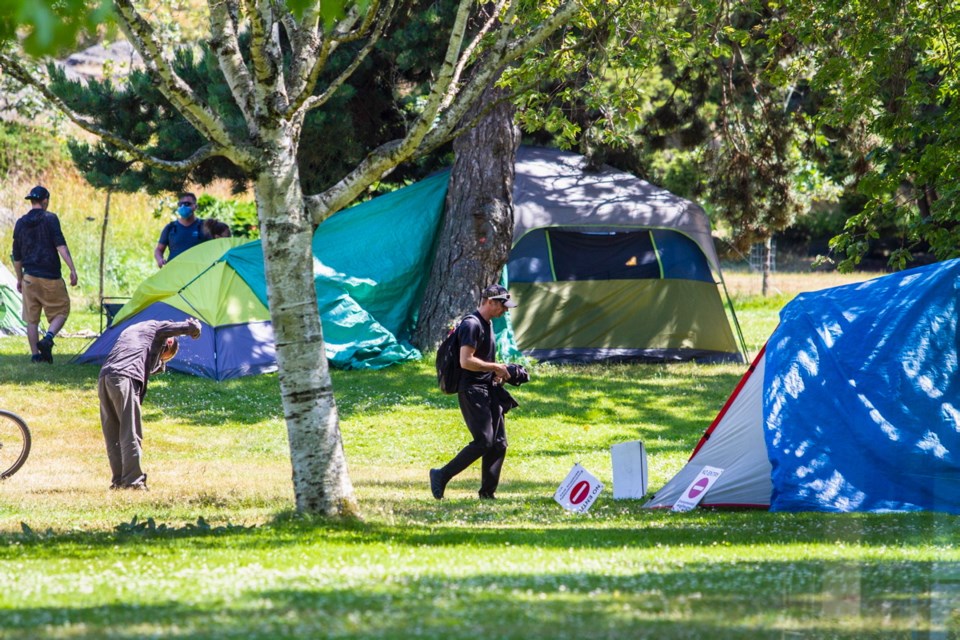As the city attempts to move campers from environmentally sensitive areas in Beacon Hill Park, some are resisting, saying they’re worried that living in more exposed locations will lead to conflict with other park users.
The city has applied for a court injunction that would require campers in sensitive areas or near playgrounds, footpaths and playing fields to move to other areas of the park. About one-quarter of the 74-hectare park would remain available for sheltering.
In announcing the injunction application Friday, Mayor Lisa Helps said bylaw officers have been asking people in the park to relocate and many have already voluntarily done so.
But some say they’re comfortable where they are and don’t want to move. They’ve built a home for themselves where they have a bit of privacy from other park users, some of whom take photos of their living situation or make threats against them.
Drew, who has been asked to relocate, said the areas that city staff have identified as acceptable for sheltering have fewer trees and offer less privacy than his current situation.
He’s part of a small community where several people are living in tents in close proximity, with a communal seating area protected from the elements under a tarp.
Privacy is a concern, because more exposure can mean more risk in an already vulnerable situation. Drew said he has been harassed in the park by people who returned later with friends and jumped him.
Devin, who lives in the same area, said he was told recently that he was going to burn to death in his sleep.
![]()
Campers are also frustrated by what they see as conflicting and changing information about where they can camp, and are suspicious of the city’s motives.
“They’re structured solely to push us out and to make it almost next to impossible for us to find comfort,” said Devin. “Once we do move to a place and we’re over to where they say is a green area now, two weeks later, they’re going to find a reason to push us out of there, too.”
Wayne has moved three times during a month of living in Beacon Hill. He started in an area with long grass that provided some privacy, “because it’s kind of shameful to be living in a park, so I just kind of hide,” but he was told to move.
“And every time you’ve got to move, it just wrecks your stuff more, and it gets taken, right. Your stuff gets stolen and taken.”
Drew, Devin and Wayne asked that their last names not be published to protect them from stigma and backlash.
Thousands of residents have voiced strong opposition to city council’s decision to allow temporary sheltering in the park during the pandemic.
More than 16,000 people have signed a petition to “save” Beacon Hill Park, asking the city to remove campers. The petition cites concerns about children playing next to tents, needles and human waste, the loss of some picnic tables to campers, fears of walking through the park at night and the effect of encampments on sensitive plants.
Helps said the city is trying to find a balance between protecting people who have nowhere else to go and conserving areas of biodiversity in Beacon Hill, such as endangered Garry oak ecosystems. She stressed that no one is being asked to leave the park.
She also said when people relocate, they might become more visible and it may appear that there are more people living in the park.
There are about 100 people living in the park, she said.
Patricia Galaczy, who lives two blocks from Beacon Hill Park, said she feels less comfortable walking through the park by herself at night.
“In the last couple of months, it’s felt not safe. I’ve been sort of yelled at. There’s been needles,” she said.
Galaczy said she understands the need for temporary sheltering during the pandemic, but she’d like to see engagement between the city and concerned residents when decisions about the park’s use are made.
Paul Huxtable was visiting the park on Sunday after months away. He said he was surprised by how few tents he saw after the many online complaints he had read about the homeless community in the park.
“It’s all based on fear and ignorance and lack of knowledge of the other,” he said. “People who’ve never been homeless don’t understand what it’s like to be homeless … people who are not housed have been housed at some point, so the perspective understanding runs in one direction and not in the other,” he said.
A hearing date for the city’s injunction application will be set later in the month, according to documents provided to campers by the city. The documents provide a list of groups that offer legal advice if campers want to respond to the city’s application in court and offer moving help from bylaw services.



